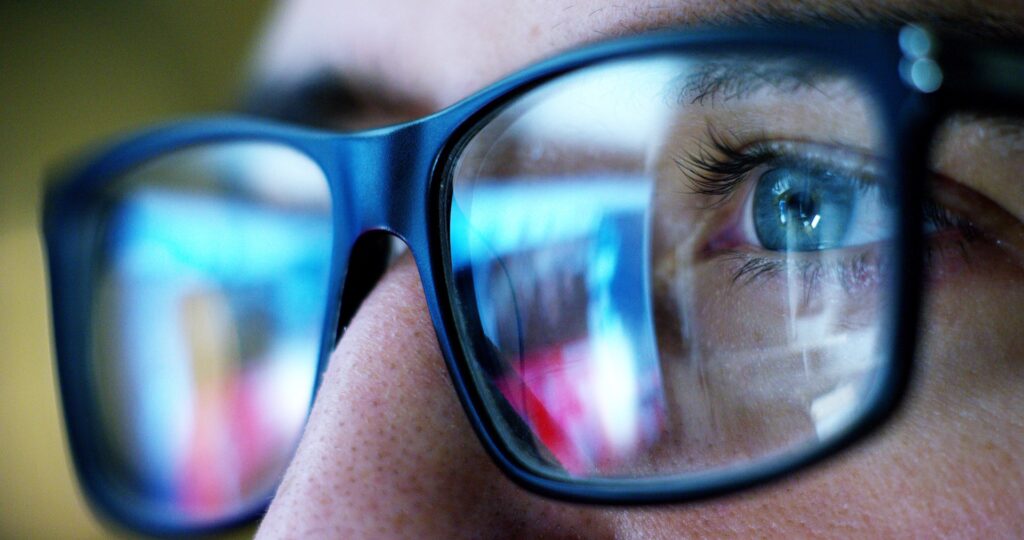With just about everyone in front of some kind of screen every day the concerns about the effect this has on our eyes are very real. One of the main aspects of the argument surrounding this issue is the blue light screens give off and how that affects our eyes. One of the proposed solutions to this is blue light glasses. You may be wondering, “What do blue light glasses do and are they worth it?”
Below we break down what blue light is, why people are concerned about it, and what tangible solutions are available to deal with all this.
What Is Blue Light?
This isn’t some simple term actually referring to something more complex. Blue light is just that: light that appears blue to our eyes. Natural blue light is always in our surroundings since much of it comes from the light spectrum emitted by the sun. Before light bulbs or LED lights were invented, the human eye was only exposed to this very intense blue light from sunrise to the evening hours.
However, since then we’ve created technology that has enabled us to create artificial blue light as well (i.e. the light that comes from smartphone displays, TVs, and other screens). These emit a relatively higher proportion of blue light compared to that of the natural world. Because we can access these devices and technology late into the evening, we’re also being exposed to it for much longer periods as well.
Is Blue Light Harmful or Damaging?
The blue light spectrum borders directly on the ultra-violet (UV) range which has long been established as a health hazard with detrimental effects on biological cells. However, that doesn’t mean it’s harmful. The actual intensities of artificial blue light from LEDs and screens are far below any currently defined thresholds related to blue light hazards.
Why Do Our Eyes Hurt or Ache After Long Periods of Being Exposed to Blue Light?
While artificial blue light hasn’t been determined to cause actual damage to the ocular system of people, you’ve likely experienced headaches, itchy or irritated eyes, or eye fatigue from looking at a smartphone, computer monitor, or TV for extended periods of time. So, what’s going on?
It’s likely that because we’re not normally exposed to this much blue light later in the evening or during the day that strains our eye muscles. We haven’t evolved to handle the amount of light we’re consuming and so we’re taxing our eyes with “digital eye strain” that causes additional discomfort.
Think about how many times a day you normally wash your hands. Now, imagine that you work in a hospital ward and have to wash your hands after every patient you interact with. Chances are your hands are going to get dry and irritated fairly quickly from all the soapy water. The same is true for blue light and our eyes. When we are readily exposed to blue light, our eyes get tired from getting put their paces more than usual with light they’ve only evolved to handle from natural sources.
Solutions to Dealing With Blue Light and What Blue Light Glasses Do
All that being said, it’s still a good idea to avoid being exposed to blue light in the evenings as the studies surrounding blue light and its effect on sleep have shown that blue light does affect our natural circadian rhythms.
One product that’s popped up a lot lately for help with all of this are blue light glasses which will filter out blue light when wearing them. These may help with eye strain in the evening, but typically won’t cause a notable difference during the day. Typically, you’re better off just avoiding screens as much as possible for eye strain or using a built-in app or blue light filter program to change the colour of the LEDs in the screen itself.
Generally speaking, several solutions to dealing with blue light are:
- Wearing blue light glasses in the evening
- Adjusting your smartphone or computer display to have a blue-light filter through your phone itself or blue-light filter apps like or programs like f.lux
- Avoiding looking at any kinds of screens 2 hours before bed
Overall, while blue light may irritate your eyes looking at a screen for too long, current research suggests it’s not detrimental to your ocular health and wearing products like blue light glasses may or may not cause a notable difference in reducing eye strain.


